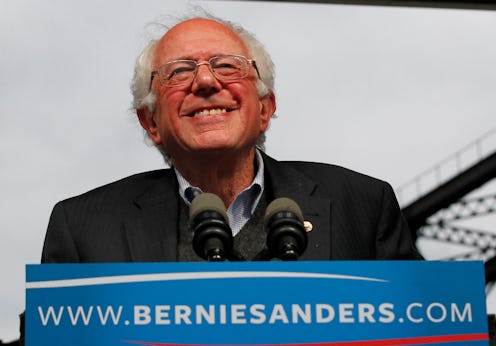News
Bernie Sanders' Political Revolution Isn't Ending
Though he's had plenty of moments of victory, Bernie Sanders just hasn't been able to pass Hillary Clinton's growing lead in delegates since the primaries began. And after Tuesday's contests, that gap only widened, with Sanders picking up a mere handful of delegates due to a narrow win in Indiana. Clinton took the remaining states, drawing herself closer to the necessary delegate total needed to secure the nomination. And since Ted Cruz and John Kasich suspended their campaigns to make room for Donald Trump as the presumptive GOP nominee, many are wondering if Sanders will drop out of the race and leave a clearer path for the former secretary of state.
However, Sanders has said that the delegate numbers are no matter and has promised to "feel the Bern" all the way through in an effort to help the Democratic Party. After his series of defeats this week, he told supporters that the Clinton campaign should still expect a contested convention come this summer. This in itself is a big win for Sanders supporters, who often rely on the idea that the delegate system is rigged unfairly to cater to the establishment candidate, and a contested convention could give Sanders the chance he needs to ultimately snag the nomination from Clinton.
But some might be left wondering what is the point in Sanders staying in the race, since, by most indications, it seems Clinton will be the nominee. There are a few theories floating around, but this is my personal favorite: Successful contested convention or not, Sanders won't give up on the race because he wants to change the Democratic establishment for the long haul. And it seems that he's already on his way there when you consider how Sanders has changed Clinton; the former secretary of state has had to adapt her platform and debate presence to Sanders', from taking a stronger stance on minimum wage to her shift on the Trans-Atlantic Partnership. The Vermont senator has left a clear impression on the former secretary of state, even if he hasn't been performing as well as she has in the polls.
In this way, Sanders will win whether he gets the nomination or not. Staying in the race may be just as much (if not more) about making sure that impression continues to affect the Clinton campaign than it is about winning the nomination. It isn't a bad strategy to have, either — if this is the case, Sanders should use his influence over the Democratic Party's message to his advantage and push these ideals that would have once been considered too radical.
Sanders' choice not to drop out of the race shows he's determined not just to win the nomination, but to leave his mark where it counts most and to possibly forever change the Democratic Party.
